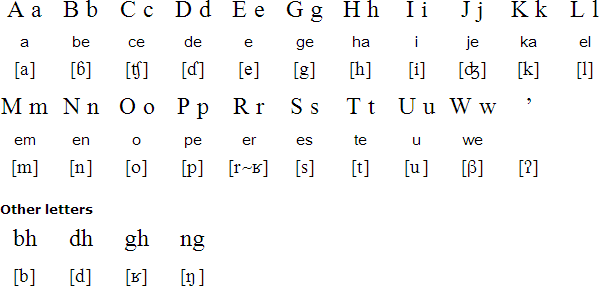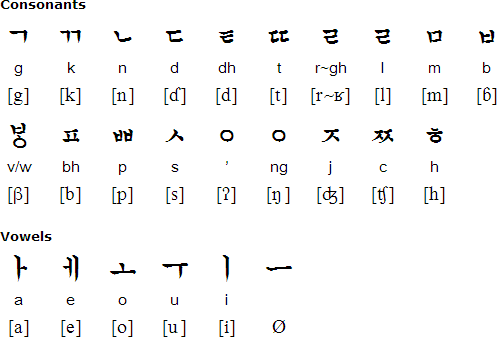Cia-Cia is a member of the Celebic branch of the Malayo-Polynesian language family. It is spoken by about 80,000 people on Buton Island, a part of Indonesia to the south east of Sualwesi. Most Cia-Cia speakers live in and around the town of Bau-Bau, on the soutern tip of Buton, and there are also speakers on Binongko and Batu Atas Islands.
Cia-Cia, which is also known as Buton(ese) or Butung, has several dialects, including Kaesabu, Sampolawa, Wabula and Masiri. It is closely related to Wolio, which many Cia-Cia speakers also speak.
Cia-Cia was originally written with the Gundul script, a version of the Arabic script, and is now written with the Latin alphabet.
Since 2009 some students in Bau-Bau have been taught to write Cia-Cia with a version of the Korean Hangeul alphabet using a textbook written by Lee Ho-young, a linguistics professor at Seoul National University. The idea of using Hangeul to write Cia-Cia was first proposed in 2007 by Professor Chun Tai-hyun, a professor of Malay and Indonesian linguistics at Hankuk University of Foreign Studies in Seoul. Contrary to media reports, Hangeul has not been adopted as the official alphabet for Cia-Cia, and the project was abandoned in 2012.


Adi sering pali nononto televisi. Amano nopo'ombae ia nanumonto televisi kolie nomolengo.
아디 세링 빨리 노논또 뗄레ᄫᅵ시. 아마노 노뽀옴바에 이아 나누몬또 뗄레ᄫᅵ시 꼴리에 노몰렝오.
Adi watches too much TV. His father advises him not to watch too much TV.
Source: http://en.wikipedia.org/wiki/Cia-Cia_language
Hear a recording of this text by La Ode Aspin, recorded by Moshe Ash.
Information about Cia-Cia | Numbers
Information about the Cia-Cia language
http://en.wikipedia.org/wiki/Cia-Cia_language
http://www.ethnologue.com/show_language.asp?code=cia
http://www.koreatimes.co.kr/www/news/nation/2010/10/113_74114.html
Banggai, Balantak, Bungku, Cia-Cia, Kodeoha, Kulisusu, Moma, Mori Atas, Mori Bawah, Moronene, Muna, Pendau, Tajio, Tolaki, Tukang Besi, Uma, Wolio
Languages written with the Latin alphabet
Page last modified: 10.06.24
[top]
You can support this site by Buying Me A Coffee, and if you like what you see on this page, you can use the buttons below to share it with people you know.

If you like this site and find it useful, you can support it by making a donation via PayPal or Patreon, or by contributing in other ways. Omniglot is how I make my living.
Note: all links on this site to Amazon.com, Amazon.co.uk
and Amazon.fr
are affiliate links. This means I earn a commission if you click on any of them and buy something. So by clicking on these links you can help to support this site.
[top]